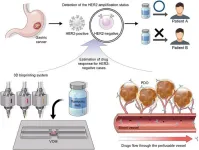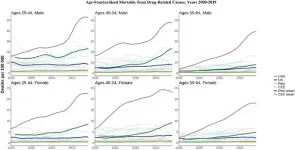(Press-News.org) Cellulose, abundantly available from plant biomass, can be converted into molecules used to make a new class of recyclable polymers, to sustainably replace some plastics.
Researchers at Hokkaido University have taken a significant step forward in the drive to make recyclable yet stable plastics from plant materials. This is a key requirement to reduce the burden of plastic pollution in the environment. They developed a convenient and versatile method to make a variety of polymers from chemicals derived from plant cellulose; crucially, these polymers can be fully recycled. The method was published in the journal ACS Macro Letters.
Cellulose is one of the most abundant components of biomass derived from plants, being a key part of the tough cell walls surrounding all plant cells. It can be readily obtained from plant wastes, such as straw and sawdust, therefore, using it as a feedstock for polymer manufacture should not reduce the availability of agricultural land for food production. Cellulose is a long-chain polysaccharide polymer, meaning that it is composed of multiple sugar groups, specifically glucose, linked together by chemical bonds.
To make their new polymers, the Hokkaido team used two commercially available small molecules, levoglucosenone (LGO) and dihydrolevoglucosenone (Cyrene), which are made from cellulose. They developed novel chemical processes to convert LGO and Cyrene into a variety of unnatural polysaccharide polymers. Varying the precise chemical structure of the polymers offers the ability to generate different materials for a range of possible applications.
“Our biggest challenges were controlling the polymerization reaction that links the smaller monomer molecules together, and obtaining polysaccharides materials that are sufficiently stable for common applications while still able to be broken up and recycled by specific chemical conditions,” says Assistant Professor Feng Li, a corresponding author.
Li adds that the biggest surprise during the research was the high transparency of the polymer films they made, which might be crucial for the kind of specialist applications that these polymers seem most suited for. “As the materials are quite rigid it may be difficult to use them as flexible plastic materials, such as plastic bags, so I expect they will be more suited for high performance materials for optical, electronic, and biomedical applications,” Professor Toshifumi Satoh, the other corresponding author, adds.
Other research groups around the world are also exploring the potential for making plastic-replacing polymers from plants, and some such ‘bioplastics’ are already commercially available, but Satoh’s group have added a significant new opportunity to this fast-developing field.
The team now plan to explore further possibilities, but the feasible structural variations are so numerous that they would like to join forces with specialists in computational chemistry, artificial intelligence and automated synthesis to explore the options.
“We hope this work will develop a wide variety of useful unnatural polysaccharide polymers to become part of a sustainable closed loop of synthesis from biomass with efficient recycling,” Li concludes.
END
New route to recyclable polymers from plants
2024-03-21
ELSE PRESS RELEASES FROM THIS DATE:
Revolutionizing gastric cancer treatment through personalized 3D bioprinting
2024-03-21
Gastric cancer ranks among the most widespread diseases in Asian populations, with South Koreans experiencing the third-highest incidence globally in 2020, as reported by the International Agency for Research on Cancer. Recently, a collaborative research effort between Pohang University of Science and Technology (POSTECH) and Yonsei University achieved advancement in the realm of precision personalized medicine for gastric cancer. By using 3D bioprinting to accurately replicate the biological environment surrounding gastric cancer cells, the researchers have achieved a significant ...
How neural inhibition could reduce alcohol use
2024-03-21
LA JOLLA, CA—Neuroscientists at Scripps Research have found that inhibiting neurons involved in the body’s stress response may reduce alcohol consumption in people who have both post-traumatic stress disorder (PTSD) and alcohol use disorder (AUD)—even if they still experience trauma-related anxiety.
The findings were published March 21 in Molecular Psychiatry. These discoveries are helping untangle the complex role that stress and trauma play in neurological disorders like PTSD and AUD, while also informing the development of new treatment options for people who experience both these conditions simultaneously.
“Traumatic ...
The Lancet: Dramatic declines in global fertility rates set to transform global population patterns by 2100
2024-03-21
Embargoed access to the paper and contact details for authors are available in Notes to Editors at the end of the release.
By 2050, over three-quarters (155 of 204) of countries will not have high enough fertility rates to sustain population size over time; this will increase to 97% of countries (198 of 204) by 2100.
Pronounced shifts in patterns of livebirths are also predicted, with the share of the world’s live births nearly doubling in low-income regions from 18% in 2021 to 35% in 2100; and sub-Saharan Africa accounting for one in every two children born on the planet by 2100.
In low-income settings with higher fertility rates, better access to contraceptives and female education ...
NHS needs 32 billion cash injection to recover shortfall and help tackle current crisis
2024-03-21
The NHS needs an immediate cash injection of around £8.5bn a year over the next four years to make up a £32bn shortfall in funding and help tackle the current crisis, especially in areas such as waiting times, access to primary care, workforce and capital investment, say experts in the second report of The BMJ Commission on the Future of the NHS.
John Appleby and colleagues argue that, while the government’s recent spring budget funding pledges are a start, they “certainly will not make up the significant shortfall that the NHS ...
Many publicly accessible AI assistants lack adequate safeguards to prevent mass health disinformation
2024-03-21
Effective processes for reporting and responding to safeguard vulnerabilities are also lacking, warn experts
Many publicly accessible artificial intelligence (AI) assistants lack adequate safeguards to consistently prevent the mass generation of health disinformation across a broad range of topics, warn experts in The BMJ today.
They call for enhanced regulation, transparency, and routine auditing to help prevent advanced AI assistants from contributing to the generation of health disinformation.
Large language models (LLMs) are a form of generative AI that have the potential to greatly improve many aspects of society, including ...
New study highlights troubling trends in midlife mortality in the US and UK
2024-03-21
A new study by researchers at the Leverhulme Centre for Demographic Science (LCDS) and Princeton University reveals that US working-age adults are dying at higher rates than their peers in high-income countries; the UK is also falling behind. The study is published today in the International Journal of Epidemiology.
Using annual mortality data from the World Health Organization Mortality Database, the study compared trends in midlife mortality for adults aged 25-64 years between 1990 and 2019 across 15 major causes of death in 18 high-income countries, ...
Nudging the public’s thirst for draught alcohol-free beers could significantly reduce alcohol-associated harms, new study finds
2024-03-21
Making alcohol-free beer more widely available on draught in pubs and bars may help people switch from alcoholic to alcohol-free beer, a new study published in Addiction today [21 March], has found. Pubs and bars taking part in the University of Bristol-led trial saw an increase in sales of healthier non-alcoholic draught beer.
In partnership with Bristol City Council (BCC), researchers from the University’s Tobacco and Alcohol Research Group (TARG) recruited 14 pubs and bars across the city that were willing to change the drinks that they offered on draught for a limited period. Previous research by the same group, using an online experiment as a proxy for real-world behaviour, ...
Millions are at risk using high arsenic water for cooking
2024-03-21
Around 32 per cent of the world's population live in countries that do not adhere to the World Health Organisation’s recommendations on safe limits of arsenic in drinking water
Rice is already known to contain more inorganic arsenic than other cereals
Cooking rice with water containing more than 10 µg L-1 (parts per billion) inorganic arsenic amplifies the risk of arsenic exposure
Long-term exposure to inorganic arsenic in water can cause serious health problems such as cancers, diabetes and pulmonary and cardiovascular diseases
Rice is one of the major cereal crops ...
TLI investigator Dr. Nicholas Jenzjowsky receives NIH/NIAID grant to investigate the neural regulation of asthma
2024-03-21
In a significant stride for respiratory medicine, Lundquist Institute (TLI) investigator Nicholas Jendzjowsky, PhD, has been awarded a prestigious grant from the National Institute of Health/National Institute of Allergy and Infectious Diseases (NIH/NIAID). This grant, totaling $298,800, not only underscores TLI's commitment to pioneering research and excellence in respiratory medicine and exercise physiology but also recognizes Dr. Jendzjowsky's expertise and the importance of his research.
The ...
Doctors’ pay in England has declined by 25% since 2008
2024-03-21
Doctors’ pay in England has declined by 25% since 2008
Independent analysis shows doctors’ salary erosion far outstrips other UK workers
Doctors describe how they struggle to afford everyday essentials
Trainee eye surgeon quit after worry over gas bill
As doctors in England enter their 13th month of industrial action, an independent analysis of their pay confirms that the real terms value of their salaries has declined by a quarter in the 15 years since their pay was frozen.
The analysis – conducted for The BMJ by the Office of Health Economics (OHE), an independent health economics research organisation – found that across ...





